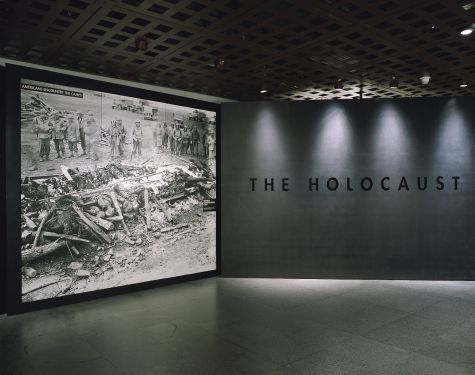East students hear stories from Holocaust survivors
January 20, 2016
As about a dozen students stepped out into the warm and sunny morning, Dr. Burns led the way. We were thrilled to be out of class on such a gorgeous day, but uncertain about what to expect as we walked from the high school towards the Jewish Community Center.
On Oct. 13, several former Rosa Middle School students went to the JCC in Cherry Hill for a luncheon. I was part of this group. Last year, we created art projects for the Holocaust and Resilience language arts unit. Fifteen students’ projects were chosen to be on display in the Goodwin Holocaust Museum and Education Center. The art was presented on a stage and in the museum. The luncheon included touching stories shared by local Holocaust survivors and members of the New Jersey Commission on Holocaust Education.
Sitting at a table of eight, a confident, elderly Polish woman wearing pearls, glasses and a hot pink sweater recounted to us the difficult decision she had to make. When she was 13 years old, her family was taken during a raid to a German labor camp. Her father gave someone money to try to help his children escape. She never saw her parents thereafter, but she and her older sister stayed together for a while. Eventually, an opportunity arose for one sister to escape, but the other would have to stay in the camp. She made the courageous choice to stay because she felt she had a better chance of surviving. She said that she looked younger than her sister, and the young were not pushed to work as hard in the camp.
Charles Middleberg, an 85 year old survivor, is more focused on teaching the future how to learn from reliving the past. During the school year, he said that he speaks to schools one to three times a week about the Holocaust. He wants everyone to know exactly what happened so people understand how respecting and not judging differences among us is so crucial to our survival as humans. He stressed that differences are not important and neither is perfection.
“I do not know how much I touch you. I am not sure that whatever I have to say has any significance to young men and women, [but] I hope to leave some kind of mark,” Middleberg said. Charles was around 10 when he was taken by the Nazis. He lost his father when he was 11, and never saw his mother after he turned 12.
In his speech, Charles stated that he wants his audience to take away at least one thought.
He said, “We are all part of the same human race. If one of us happens to cut ourselves, everyone bleeds the same red blood.” He felt that to hate is to do harm and nobody should be allow themselves to be swayed to hate. He articulated, “The Germans have a tremendous legacy of genius and are highly intelligent people, but they let themselves be talked into hatred.”
Charles keeps talking about his views and experiences and wants the students to share their stories so they will not be forgotten. As we walked back, reflecting on what we just experienced, Emma Stopek (’19) said, “I think it’s so important to share these survival stories because the world has not really learned from them yet. Even today genocide is still occurring in places like Darfur and Sudan.”
I was amazed how differently a classroom with a textbook recounts the Holocaust as opposed to a conversation with a survivor. I realized words such as hate, tolerance and blame are powerful, yet they are words for the ignorant. Acceptance is a word for the hesitant. Celebrating and appreciating differences is for the wise. I know the Cherry Hill East students were so grateful for the people we encountered on that beautiful autumn day.
